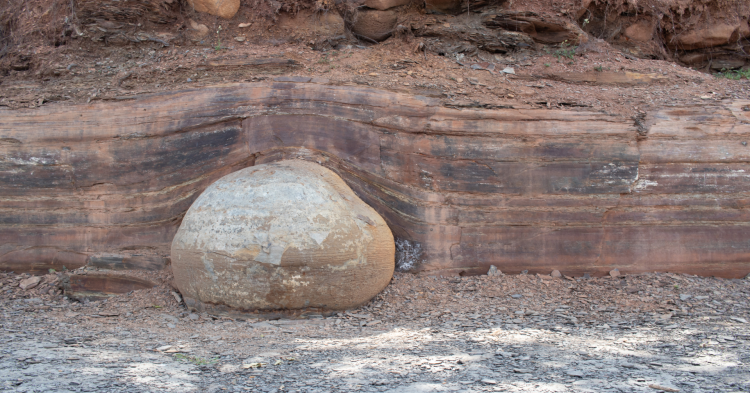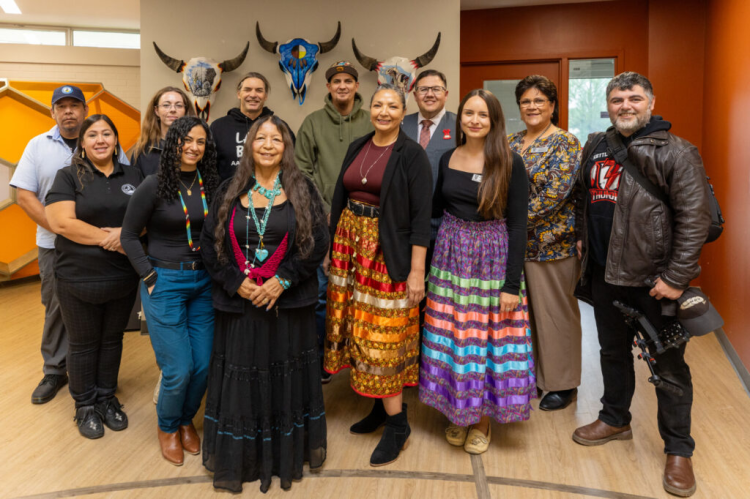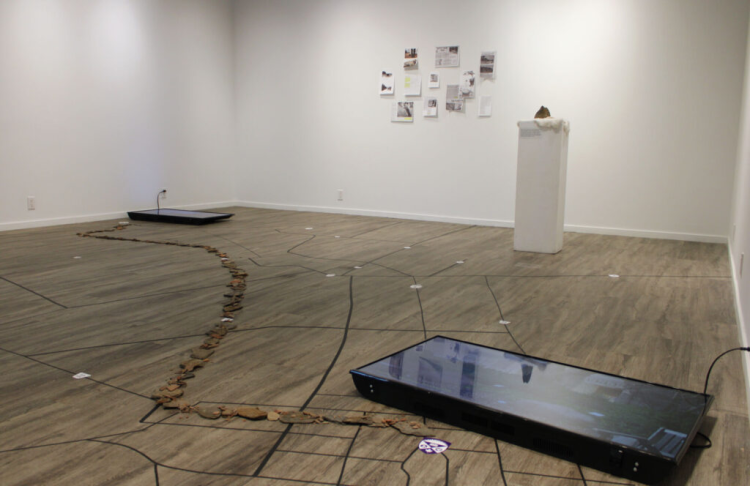Western is working closely with Kettle and Stony Point First Nation to ensure culturally and spiritually sacred kettles currently housed on campus are returned to the Indigenous community where they originated, an effort that builds on the university's commitment to reconciliation.

Known as Thunderbird eggs (Nimkii Waawaanag) in Anishinaabe communities, the rocks are linked to the spiritual beings that bring healing rains and are a central feature of the creation story for many First Nations. Also called kettles, they are a rare geological feature; spherical boulders of calcite crystals that formed more than 350 million years ago in shale beds that run through southwestern Ontario. The kettles have now been revealed through shoreline wave erosion in Lake Huron and occasionally found during excavation elsewhere.
There are three kettles - named for the resemblance to large cooking pots - together with fragments of others on Western's campus. Their journeys to campus are unique, ranging from scientific collection to natural forces. The largest kettle was donated to the Faculty of Science more than 25 years ago after being dug up from the shale bedrock below a gravel pit near Chatham, Ont. A second kettle was brought to campus by glaciers more than 15,000 years ago and discovered when excavating for the construction of Weldon Library. The smallest of the three kettles, plus a group of fragments, likely were collected at Kettle Point and ended up in the geological collections of former researchers.
The largest kettle, currently in one of Western's gardens, and others on campus are now just days away from being rematriated in a collaborative project between Kettle Point Elders, knowledge keepers, scientists and Indigenous leaders on campus.
The process of returning the kettles is known as rematriation instead of repatriation, because it centres Indigenous women-led work and the desire to reconnect people with ancestral lands and objects.

Community members from Kettle and Stony Point First Nation and Western staff, leaders and Elders gathered Oct. 23 at the Wampum Learning Lodge for an event to honour the rematriation of the kettles. (Alejandro Quijas Sanroman/Western Communications)
Christy R. Bressette, Western's vice-provost and associate vice-president (Indigenous initiatives), said moving the kettles back to the Indigenous community is long overdue.
"The rematriation of the Thunderbird eggs (Nimkii Waawaanag), sacred beings in the form of stone concretions' back to Kettle and Stony Point First Nation (Wiiwkwedong: Kikonong miinwaa Aazhoodenaang), represents a powerful moment of relationship-building and trust," she said.
"Western is honoured to support this return, which reflects our commitment to advancing reconciliation with Indigenous communities. This work has deepened our relationship with the community and reaffirmed the importance of trust, respect and shared responsibility in our journey forward together. Witnessing this process has been a humbling reminder of the responsibilities we carry as an institution to honour Indigenous knowledge, sovereignty and sacred connections to land."

Genevieve Buchanan, BFA'25, created an exhibition about the Thunderbird eggs called gdaa-giiwemin (we should go home). It ran at the Forest City Gallery in August. (Genevieve Buchanan)
Western is committed to prioritizing reconciliation in classrooms, on campus and in the community through the work of decolonization and Indigenization, as embedded in the university's strategic plans, Towards Western at 150, Advancing Inclusive Excellence and its Indigenous Strategic Plan.
From community outreach activities to opening the Wampum Learning Lodge, Western has invested in reconciliation through its budgets and campus programming. Earlier this year, two new guides to Indigenous allyship were launched by the Office of Indigenous Initiatives and Western Research. The university supports Indigenous students with scholarships and opportunities for important cultural connections, among other programs.
Kettles return to 'Point' at Kikonong
The spiritual significance of the kettles is also tied to their original location, the waterfront that's considered the nesting place of the Thunderbirds. Teachings based in Indigenous knowledge describe the site as comprised of powerful energy, but according to some, that protection is lost when the kettles are removed. Others believe returning the kettles to their home waters will revive them.
After years of community collaboration and months of consultation on location and logistics, the kettles will be moved to the water in front of the pow wow grounds, near the Point' at Kikonong (Kettle Point).
David Cloud, a Kettle and Stony Point First Nation council member, said it's an important milestone.
"Our culture and language come along with these rocks. There's a lot of history behind this. I know there are other messages that those Thunderbird eggs carry," he said.
Returning the kettles may open the door for similar processes to begin elsewhere, Cloud said.
"This will set a precedent for other institutions that may hold artifacts," he said.
"These are our identities. Some people at home are going to be ecstatic to have their identities coming back home. It goes really deep." - David Cloud, Kettle and Stony Point First Nation council member
Sacred symbol, scientific marvel
Cloud and others spoke at a day-long educational event for the public and campus community at Western's Wampum Learning Lodge on Oct. 23. The session honoured the Indigenous traditions around the Thunderbird eggs and explained their cultural and academic significance ahead of the kettles being transported home in early November during Treaty Recognition Week.
"Reconciliation is an ongoing commitment - one that requires us to continually deepen our actions and ensure they are guided by Indigenous knowledge and priorities. The return of the Thunderbird eggs is a powerful example of that commitment. It strengthens our responsibility as a university to honour sacred knowledge, care for the land and align our work with the priorities of the communities we serve," said Florentine Strzelczyk, provost and vice-president (academic).
"We are honoured to walk alongside the Kettle and Stony Point community in this effort and deeply grateful for the leadership of Indigenous faculty, staff and students who continue to shape and guide this work."
Desmond Moser, Earth sciences professor and assistant dean of decolonization in the Faculty of Science at Western, is supporting the work, including the logistics of moving the 1.5 tonne kettle.
"From a technical point of view, we're doing everything we can to make sure these fragile kettles are returned home in the right way," Moser said. He emphasized the most essential element of the move is respecting community wishes. "It's important to answer and respect the calls of community," Moser added.
That includes carefully lifting the kettle, wrapped in burlap instead of plastic, using high-strength strapping to situate it on the flatbed of a landscaping truck, surrounded by cedar chips. They'll be carefully watered, to respect the cultural teaching that kettles be watered or kept in water.
"This is an incredible teaching and learning moment for us. Beyond being educated, this is an opportunity to respond to the calls of the Truth and Reconciliation Commission," Moser said. "We're deeply grateful that the community is open to this partnership and the dialogue about rematriating the Thunderbird eggs."













